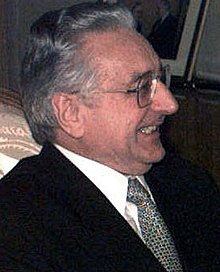Franjo Tuđman
|
Vrhovnik Franjo Tuđman |
|
|---|---|
 |
|
| 1st President of Croatia | |
|
In office 30 May 1990 – 10 December 1999 |
|
| Prime Minister |
Stjepan Mesić (1990) Josip Manolić (1990–91) Franjo Gregurić (1991–92) Hrvoje Šarinić (1992–93) Nikica Valentić (1993–95) Zlatko Mateša (1995–99) |
| Preceded by | Ivo Latin (as President of the Presidency of Croatia) |
| Succeeded by | Vlatko Pavletić (acting) |
| 1st President of the Croatian Democratic Union | |
|
In office 17 June 1989 – 10 December 1999 |
|
| Preceded by | Office established |
| Succeeded by | Vladimir Šeks (acting) |
| Personal details | |
| Born |
14 May 1922 Veliko Trgovišće, Kingdom of Serbs, Croats and Slovenes (now Croatia) |
| Died | 10 December 1999 (aged 77) Zagreb, Croatia |
| Resting place | Mirogoj, Zagreb, Croatia |
| Nationality | Croat |
| Political party | Croatian Democratic Union |
| Other political affiliations |
League of Communists of Yugoslavia (1942-1967) |
| Spouse(s) | Ankica Tuđman (née Žumbar) |
| Children |
Miroslav Stjepan Nevenka |
| Alma mater |
Belgrade Military Academy University of Zagreb |
| Profession | Politician, historian, soldier |
| Religion | Lapsed Catholic (considered atheist by some), see Relation to the Catholic Church |
| Signature | |
| Website | tudjman |
| Military service | |
| Allegiance |
Yugoslavia Croatia |
| Service/branch |
Yugoslav Partisans (1942–45) Yugoslav People's Army Ground Forces (1945–61) Croatian Armed Forces |
| Years of service | 1942–1961 1995–1999 |
| Rank |
Major General (YPA) Vrhovnik (HV) |
| Unit | 10th Zagreb Corps |
| Battles/wars |
World War II in Yugoslavia Croatian War of Independence |
Franjo Tuđman (Croatian pronunciation: [frǎːɲo tûd͡ʑman]; 14 May 1922 – 10 December 1999) was a Croatian politician and historian. Following the country's independence from Yugoslavia he became the first President of Croatia and served as president from 1990 until his death.
Tuđman was born in Veliko Trgovišće, Croatia. In his youth he fought during World War II as a member of the 10th Zagreb Corps of the Yugoslav partisans. After the war he took a post in the Ministry of Defence, later attaining the rank of major general of the Yugoslav Army in 1960. After his military career he dedicated himself to the study of geopolitics. In 1963 he became a professor on the Zagreb Faculty of Political Sciences. He received a doctorate in history in 1965 and worked as a historian until coming into conflict with the regime. Tuđman participated in the Croatian Spring movement that called for reforms in the country and was imprisoned for his activities in 1972. He lived relatively anonymously in the following years until the end of communism, whereupon he began his political career by founding the Croatian Democratic Union (HDZ) in 1989.
HDZ won the first Croatian parliamentary elections in 1990 and Tuđman became the President of the Presidency of SR Croatia. As president, Tuđman pressed for the creation of an independent Croatia. On 19 May 1991 an independence referendum was held, which was approved by 93 percent of voters, and on 25 June 1991 Croatia declared its independence from Yugoslavia. Areas with a Serb majority revolted, backed by the Yugoslav army, and Tuđman led Croatia during its War of Independence. A ceasefire was signed in 1992, but the war had spread into Bosnia and Herzegovina. Tuđman faced criticism for his role in the Croat-Bosniak War that jeopardized international support for Croatia. In March 1994 he signed the Washington Agreement with Bosnian President Alija Izetbegović that re-allied Croats and Bosniaks. In 1995 he authorized a major offensive known as Operation Storm which effectively ended the war in Croatia. In the same year he was one of the signatories of the Dayton Agreement that put an end to the Bosnian War. He was re-elected president in 1992 and 1997 and remained in power until his death in 1999.
...
Wikipedia
